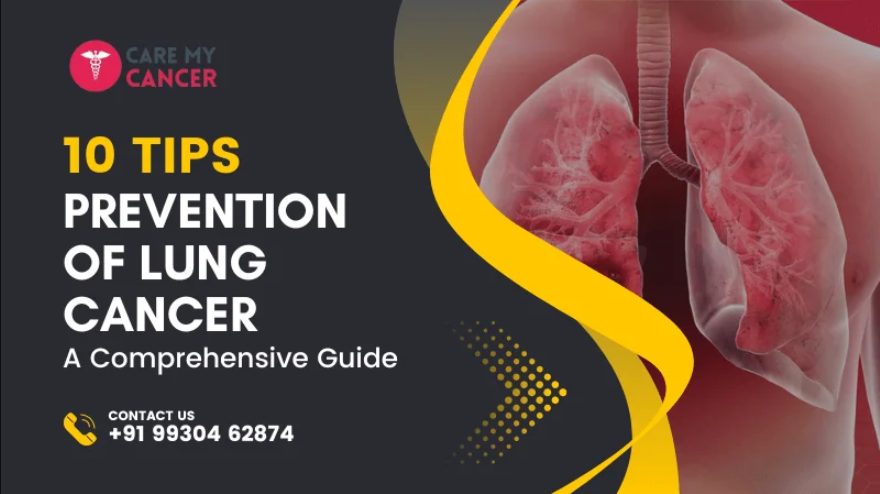In today’s health-conscious world, preventing diseases like lung cancer is paramount. Lung cancer remains one of the most common and deadliest cancers worldwide. However, the good news is that many cases of lung cancer can be prevented through lifestyle changes and proactive health measures.
About Lung Cancer
Lung cancer occurs when cells in the lungs mutate or change. These abnormal cells begin to grow uncontrollably, forming tumors and interfering with the lung’s ability to function properly. There are two main types of lung cancer: non-small cell lung cancer and small cell lung cancer.
Non-Small Cell Lung Cancer
Non-small cell lung cancer is the most common type, accounting for approximately 85% of all cases. It typically grows and spreads more slowly than small cell lung cancer.
Small Cell Lung Cancer
Small cell lung cancer is less common but tends to grow and spread rapidly, making it more challenging to treat.
10 Tips Prevention of Lung Cancer
Understanding the Risks
Lung cancer risk factors include smoking, exposure to secondhand smoke, exposure to radon gas, exposure to asbestos and other carcinogens, family history of lung cancer, and air pollution.
Quit Smoking
Smoking is the leading cause of lung cancer. Quitting smoking is the single most effective way to reduce your risk of developing lung cancer.
Avoid Secondhand Smoke
Secondhand smoke contains many of the same harmful chemicals as firsthand smoke. Avoiding exposure to secondhand smoke can significantly decrease your risk of lung cancer.
Test for Radon
Radon is a radioactive gas that occurs naturally in soil and rock. Testing your home for radon and taking steps to reduce exposure can help lower your risk of lung cancer.
Protect Against Asbestos
Asbestos exposure is linked to an increased risk of lung cancer. If you work in an industry where asbestos exposure is possible, take precautions to protect yourself and follow safety guidelines.
Maintain a Healthy Diet
A diet rich in fruits, vegetables, and whole grains can help reduce your risk of lung cancer. Aim to eat a variety of nutrient-rich foods and limit processed foods and red meat.
Exercise Regularly
Regular physical activity can lower your risk of developing lung cancer. Aim for at least 30 minutes of moderate exercise most days of the week.
Get Regular Screenings
For individuals at high risk of lung cancer, such as current or former smokers, regular screenings can help detect lung cancer at an early stage when it’s most treatable.
Limit Exposure to Air Pollution
Air pollution, both indoors and outdoors, can increase your risk of lung cancer. Take steps to minimize exposure to air pollutants, such as using air purifiers and avoiding outdoor activities on high pollution days.
Seek Support
If you’re struggling to quit smoking or make other lifestyle changes, seek support from friends, family, or a support group. Having a strong support system can make it easier to adopt healthy habits and reduce your risk of lung cancer.
FAQs (Frequently Asked Questions)
- What are the early signs of lung cancer?
- Early signs of lung cancer may include a persistent cough, coughing up blood, chest pain, hoarseness, unexplained weight loss, and shortness of breath.
- Is lung cancer treatable if detected early?
- Yes, lung cancer is more treatable when detected early. Treatment options may include surgery, radiation therapy, chemotherapy, targeted therapy, and immunotherapy.
- Can non-smokers get lung cancer?
- Yes, while smoking is the leading cause of lung cancer, non-smokers can also develop the disease due to factors such as secondhand smoke, radon exposure, and genetics.
- How often should I get screened for lung cancer?
- Individuals at high risk of lung cancer, such as current or former smokers, should discuss screening options with their healthcare provider. Screening frequency may vary based on individual risk factors.
- Can lung cancer be prevented?
- While not all cases of lung cancer can be prevented, many can be avoided by avoiding tobacco smoke, reducing exposure to carcinogens, maintaining a healthy lifestyle, and undergoing regular screenings.
- What is the prognosis for lung cancer?
- The prognosis for lung cancer varies depending on factors such as the stage of the disease, the type of lung cancer, and the individual’s overall health. Early detection and treatment can improve prognosis.
Conclusion
Preventing lung cancer requires a proactive approach to health and wellness. By incorporating these 10 tips into your lifestyle, you can reduce your risk of developing lung cancer and improve your overall health and well-being.
Remember, small changes can make a big difference when it comes to preventing lung cancer. Whether it’s quitting smoking, testing for radon, or maintaining a healthy diet and exercise routine, taking steps to protect your lung health is essential for long-term wellness.

